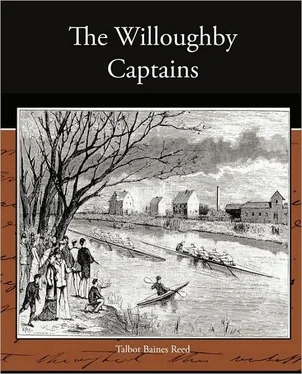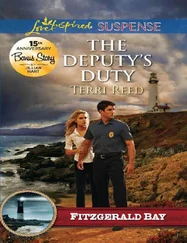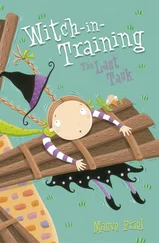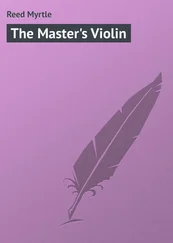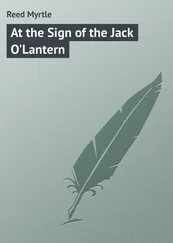“Jolly spree, wasn’t it?” said Parson, when it was all over, fanning himself with a copybook and readjusting his collar.
“Stunning!” said Telson; “never thought they’d stand it so long. No end of a speech, that of yours!”
“Yes,” said Parson, complacently; “most of it impromptu, too! Managed to spin it out, I fancy!”
“Rather,” said King, admiringly. “I began to make mine after you’d got kicked out, but couldn’t get out much of it.”
“Well, all I can say is it was a jolly lark. I feel quite hungry after it,” said Telson. “Any of that jam left, old man?”
And so these heroes appropriately celebrated their glorious field-day with a no less glorious banquet, which amply compensated for all the little inconveniences they had had to endure in the course of the afternoon’s entertainment.
Meanwhile, rather more serious work was going on in the Great Hall.
The Skyrockets being ejected, the house proceeded in a somewhat humdrum fashion to discuss the relative merits of classics and mathematics. Several of the seniors and a few Limpets had prepared speeches, which they duly delivered. Contrary to the expectation of most present, Riddell took no part in the discussion. As head classic, a speech from him had been quite counted on; but not even the calls of the one side or the taunts of the other could get him on to his feet.
The fact was, he only half heard what was going on. His thoughts were far away, busied with a far more serious inward debate than that on the notice-paper.
At length he could remain idle no longer. He must go and find out Wyndham, or see the doctor, or pay another visit to Tom the boat-boy — anything rather than this suspense and misery and inaction.
He took advantage of a more than ordinarily dreary speech from Tedbury to rise and make his retreat quietly from the room.
But before he had reached the door Tedbury’s voice abruptly ceased and Wibberly’s was heard saying, “Mr Chairman, I see Mr Riddell is leaving the meeting. Will you allow me to ask him a question before he goes?”
There was something strange about this interruption, and also in the manner in which the question was asked, which drew the sudden attention of the House, and all eyes were turned on the captain.
He stopped and turned in his usual nervous, half-inquiring way, apparently not quite sure what had been said or who had spoken.
“Mr Wibberly,” said Bloomfield, “wishes to ask a question of Mr Riddell.”
“It is merely this,” said Wibberly, rapidly, and giving no time for any objection to be raised on the point of order. “I wish to ask Mr Riddell whether he has found out yet who cut the rudder-line of Parrett’s boat at the boat-race, or whether he suspects anybody, and, if so, whom?”
At this unlooked-for question a hubbub immediately arose. Several schoolhouse fellows protested against the proceedings being interrupted in this way, and even Bloomfield exclaimed across the table, “For goodness’ sake, Wibberly, don’t bring up that wretched subject again.”
But those who had watched Riddell had seen him turn suddenly pale at the question, and for a moment make as though he would rush from the room. But he stopped himself, and turned like a hunted deer on the questioner.
A dead silence fell on the assembly, as Wibberly coolly said, “I will repeat the questions. Has Mr Riddell found out who cut the rudder-lines? or does he suspect any one? and, if so, who is it?”
Every eye turned on Riddell. The brief pause had given him time to collect himself and fight out the inward battle; and now he answered steadily, “I do suspect some one. But until I am perfectly sure I shall not say who it is.”
So saying, he quietly left the room.
Chapter Twenty Seven
Everything gone wrong
Riddell was fairly committed to his task now. Like the good old general who burned his ships when he landed on the enemy’s shores, he had cut off from himself the slightest possibility of a retreat, and must now either go right through with the matter or confess himself a miserable failure.
The consciousness of this nerved him with unlooked-for courage, and he walked from the Parliament that afternoon a very different being from the boy who had entered it. He had entered it cowed, irresolute, wretched; he left it indeed still wretched, but with his spirit roused and his mind made up. His duty lay clear before him, and whatever it cost he must do it.
Whether Wibberly was himself the writer of the mysterious letter, or whether some one had prompted him to ask the question, or whether his asking it just at this time was a mere coincidence, he did not trouble to decide.
He felt rather grateful to him than otherwise for having asked it, just as one is occasionally grateful to the thunder-clap for clearing the air.
The first thing without doubt was to find Wyndham, and come to a clear understanding as to whether or not he was the culprit; and the captain lost no time in attempting to put this resolve into practice.
It would not do, he knew, immediately after the scene in the Parliament, when everybody would be on the tip-toe of curiosity, to be seen holding a secret interview with any particular boy. He therefore decided wisely to wait till the usual time when Wyndham was in the habit of coming to his study to do his lessons. Meanwhile, to make sure of his coming, he sent him a message by Cusack to tell him to be sure and turn up.
Cusack, little suspecting the importance of this simple message, delivered it glibly, and being of course brimful of the excitement of the hour, he remained a little to regale Wyndham with a history of the afternoon’s events.
“Oh, I say,” said he, “you weren’t at Parliament this afternoon. There was no end of a shine on.”
“Was there?” asked Wyndham.
“Rather. What do you think, those young Parrett’s cads came down in a body and kicked up the biggest row you ever saw — said they were a club, and made no end of beasts of themselves, and got kicked out at last, and serve them right too.”
“They’re always fooling about at something,” said Wyndham.
“That they are. They want a good taking down, and we mean to do it next week in the junior house match.”
“Ah,” said Wyndham, who amid all his recent troubles could never forget that he was a second-eleven man. “Ah, I heard the juniors’ match was to come off. What day is it to be?”
“Thursday.”
“Oh, I must come and have a look at you. Is Welch’s going to win?”
“Going to try, and I fancy we’re pretty fair. They’ve been lazy, you know, in Parrett’s, and so we get a pull there. Oh, but I was saving that row with the kids wasn’t all this afternoon. Just at the end that cad Wibberly got up and asked Riddell some more about the boat-race — they’re always hammering away at that, and what do you think Riddell said — guess!”
“I can’t,” said Wyndham.
“Why he said he knew who the chap was who had cut the strings, or fancied he did!”
“Who is it?” exclaimed Wyndham, excitedly.
“That’s what he won’t say. And of course there’s an awful row on. They say they’ll make him tell, or kick him out of the school or something. They’re in no end of a rage.”
“Why doesn’t he tell who it is?” asked Wyndham.
“Oh, he says he’s not sure, or something like that. But I dare say he’ll tell you all about it this evening. You’re to be sure and turn up, he says, at preparation time.”
And off went this vivacious messenger, leaving Wyndham in a considerable state of astonishment and perturbation.
What did Riddell want him for? He had not seen him since that evening, a week ago, when he had so nearly confessed to him about Beamish’s. He hardly liked not to go now, although he knew it would be hard to avoid letting out the wretched secret which he had promised Gilks and Silk to keep.
Читать дальше
